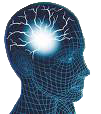Migraine warnings !
by admin
Once again new research has confirmed what most headache specialists already knew anecdotally; For patients with migraine, repetitive yawning may accompany or precede a migraine attack.
The study was published in the February issue of Headache.
It involved a cross-sectional study of 339 patients with long-standing migraine (mean age, 35.5; 301 women), 154 (45.4%) reported repetitive yawning during migraine attacks: 11.2%, in the premonitory phase; 24.2%, during headaches; and 10%, both in the premonitory phase and during headaches.
Why is this useful?
Firstly it further illustrates that migraine is more than just a headache disorder, that various parts of the brain are affected in different ways & at different times throughout the migraine ‘experience’.
Secondly it can be a valuable early signal to the patient to identify an impending attack so that they may take appropriate actions to treat/manage their migraine early, whether it be via medication &/or behaviour ( change environment, rest, relax, eat, drink etc ).
It is well recognised that early interventions have a much better chance of preventing a full blown migraine attack.
The problem is that early symptoms/signs, including yawning, that may accompany/ precede a migraine attack may be subtle, and patients may misattribute these symptoms to other causes, for example, too little sleep or too little caffeine. Patients therefore need to be vigilant in order to notice them.
Fortunately there are usually ‘groups’ of subtle warning signs that occur together, making them easier to identify as warnings of an impending migraine, for example;
Changes in level of energy.
Visual disturbance.
Pins & needles, tingling, numbness( usually head/face/arms, but can be anywhere).
Sensitivity to light/sound/touch.
Aching/pain in the neck, face, jaw etc.
Hunger pangs or loss of appetite.
Unpleasant ‘tastes’ in the mouth.
Mood changes/ irritability / depression etc.
Digestive discomfort/ nausea.
Changes in bowel or bladder function/frequency.
So my advice to patients is: If you find yourself experiencing any of the above at odd times, you should take note because it’s possible that a headache is oncoming, and you may want to be prepared with your medication or make behavioral changes that you know have helped in the past.
However it is worth stressing that not all migraines have accompanying symptoms such as those mentioned above.
Also if you have had migraines before without the above symptoms, but then start to develop them, it is important to seek the opinion of a headpain specialist.
Comments
Leave a Reply

